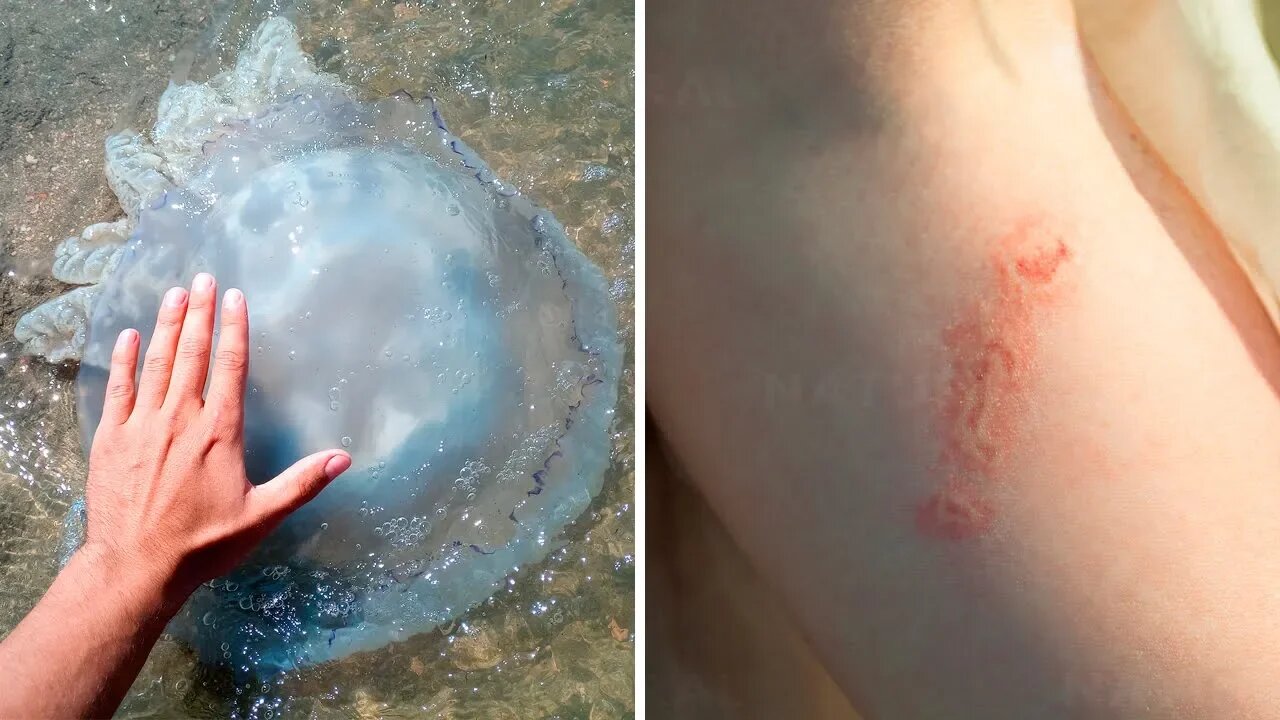Premium Only Content

How To Treat Jellyfish Stings Naturally
Ah, summertime! Vacations, sea, and resting.
But, there is something hidden in the sea that leave many people worried, even in those days of leisure: Jellyfish!
Were you ever hurt by one of these? Wonder what to do in case of an accident with a jellyfish?
Do you know the best medicine to treat jellyfish sting? No, it is not pee!
Actually, urine worsens the situation because it stimulates the release of poison, and makes the burning sensation worse.
Many people think that this is the best way to treat the sting of a jellyfish.
But there are many natural medicines to take care of this.
See some useful tips:
Remove the tentacles
If there are any tentacles in the affected area, remove them with tweezers, a popsicle stick, or with seawater. Fresh water will stimulate the tentacles to release more poison.
White vinegar
After removing any existing tentacles, a great way to alleviate the pain and neutralize the poison is to apply white vinegar on the area, for 30 seconds. Vinegar contains a substance called acetic acid, which neutralizes jellyfish poison.
Tea tree oil
As we have already seen on the channel, tea tree oil helps a lot to take care of spots and scars on the skin. It is amazing. To treat jellyfish stings with tea tree oil, do the following: Mix 0.33 oz of tea tree oil with 0.67 oz of lavender oil and apply on the spot.
Water and baking soda
Prepare a creamy mixture using baking soda and some water. Put it over the spot and let it act for at least 30 seconds. Baking soda helps soothe the itching. Avoid scratching, touching or rubbing the area, as it may stimulate the toxins.
Aloe vera and marigold
Aloe vera and marigold can also alleviate the lesions caused by jellyfish stings. Wash the affected area with seawater and let it dry. After that, apply a marigold or aloe vera based cream or gel.
If the pain lasts more than 1 day, or in case of other symptoms such as vomiting, nausea, muscle cramps, difficulty breathing or sensation of closed throat, go to emergency care. The doctors will verify the necessity of treatment with antidotes or antibiotics.
Jellyfish stings are annoying, but usually not fatal, unless the person is sensitive to the poison.
And remember: to not be stung by a jellyfish, avoid going to jellyfish infested beaches. Respect their natural habitat and enjoy your summer without worries!
----------------------------------------
Facebook: https://bit.ly/38BWbw3
Pinterest: https://bit.ly/2Irvwa6
Disclaimer: The materials and the information contained on Natural Cures channel are provided for general and educational purposes only and do not constitute any legal, medical or other professional advice on any subject matter. These statements have not been evaluated by the FDA and are not intended to diagnose, treat or cure any disease. Always seek the advice of your physician or other qualified health provider prior to starting any new diet or treatment and with any questions you may have regarding a medical condition. If you have or suspect that you have a medical problem, promptly contact your health care provider.
-
 3:55
3:55
Natural Cures
1 year ago $0.97 earnedDrink This Tea Tonight to Flush Out All The Toxins from the Body
4.17K6 -
 LIVE
LIVE
Badlands Media
9 hours agoBadlands Daily: September 2, 2025
4,463 watching -
 1:43:36
1:43:36
Dear America
3 hours agoTrump CALLS OUT PFIZER!! We Were Always Right…
82.2K68 -

Matt Kohrs
12 hours agoMarket Open: September Stock Market CRASH?! || The Top Live Trading Show
15.8K2 -
 LIVE
LIVE
The Big Mig™
2 hours agoThe Shadow Empire: Soros Empire, and the Arabella Web
4,732 watching -
 29:30
29:30
Rethinking the Dollar
1 hour agoDEBT Doom Loop Guarantees Higher Metal Prices | Morning Check-In: Let's Talk...
1.58K4 -
 8:05
8:05
Buddy Brown
4 days ago $1.16 earnedMinneapolis Mayor's QUOTE Comes Back to HAUNT HIM! | Buddy Brown
7757 -
 45:29
45:29
Randi Hipper
1 hour agoPRESIDENTIAL FAMILY CRYPTO PROJECT PLUMMETS AS BITCOIN BREAKS OUT
1.17K -
 LIVE
LIVE
GritsGG
2 hours agoRumble Customs! 3515 Ws! 🫡!
98 watching -
 LIVE
LIVE
Wendy Bell Radio
6 hours agoThe Party Of Workers
7,197 watching